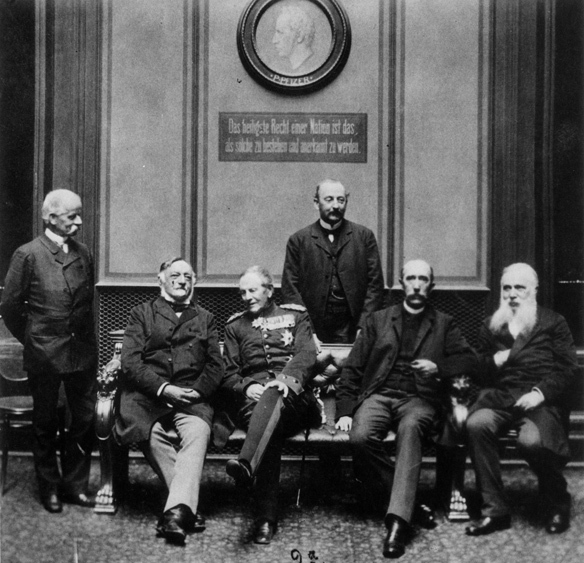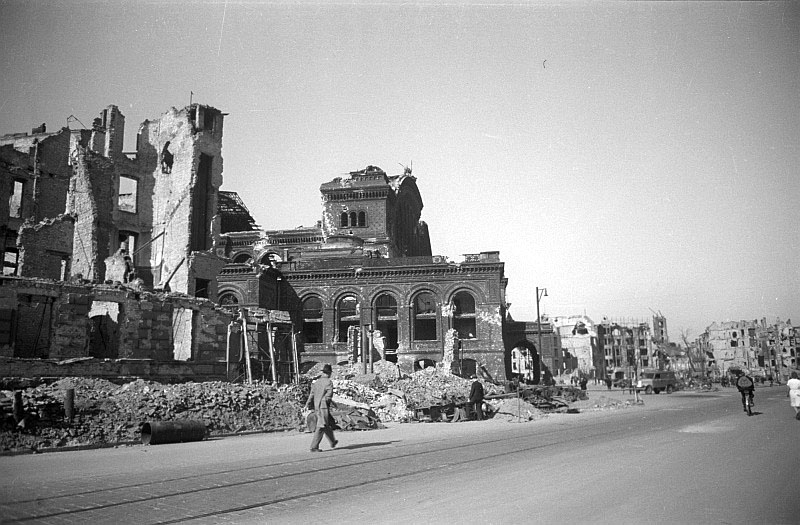|
Tivoli Congress
The Tivoli Congress was a general meeting of the German Conservative Party, which took place on December 8, 1892 in the Tivoli Brewery on the Kreuzberg. It was a major turning point for the party, as the first time that antisemitism Antisemitism (also spelled anti-semitism or anti-Semitism) is hostility to, prejudice towards, or discrimination against Jews. A person who holds such positions is called an antisemite. Antisemitism is considered to be a form of racism. Antis ... became widely supported as a policy. Several members believed that the party had to become more "demagogic", and that the way to do this was to embrace the current trend of antisemitism. Ultimately, the party began a new program that openly supported antisemitism, which continued until 1918. References Politics of the German Empire Conservatism in Germany 1892 in Germany 1892 conferences Political party assemblies 19th-century political conferences December 1892 events 1890s political events< ... [...More Info...] [...Related Items...] OR: [Wikipedia] [Google] [Baidu] |
German Conservative Party
The German Conservative Party (german: Deutschkonservative Partei, DkP) was a right-wing political party of the German Empire founded in 1876. It largely represented the wealthy landowning elite Prussian Junkers. The party was a response to German unification, universal and equal franchise in national elections and rapid industrialization. It changed from a diffuse party of broad ideology into an interest party in Bismarckian Germany. In the early 1870s, Otto von Bismarck formed his majority with the base in the National Liberal Party which emphasized free trade and anti-Catholicism. Bismarck broke with them in the late 1870s, by which time the German Conservative Party and the Free Conservative Party had brought together the landed Junkers in the East and the rapidly growing industrial leadership in the major cities. They now became the main base of Bismarck's support and successive Chancellors down to 1918. According to Robert M. Berdahl, this redirection illustrated "the ... [...More Info...] [...Related Items...] OR: [Wikipedia] [Google] [Baidu] |
Kreuzberg
Kreuzberg () is a district of Berlin, Germany. It is part of the Friedrichshain-Kreuzberg borough located south of Mitte. During the Cold War era, it was one of the poorest areas of West Berlin, but since German reunification in 1990 it has become more gentrified and known for its arts scene. The borough is known for its large percentage of immigrants and descendants of immigrants, many of whom are of Turkish ancestry. As of 2006, 31.6% of Kreuzberg's inhabitants did not have German citizenship. Kreuzberg is noted for its diverse cultural life and experimental alternative lifestyles, and is an attractive area for many, however, some parts of the district are still characterized by higher levels of unemployment. The counterculture tradition of Kreuzberg led to a plurality of votes for the Green Party, which is unique among all Berlin boroughs. Geography Layout Kreuzberg is bounded by the river Spree in the east. The Landwehrkanal flows through Kreuzberg from east to ... [...More Info...] [...Related Items...] OR: [Wikipedia] [Google] [Baidu] |
Antisemitism
Antisemitism (also spelled anti-semitism or anti-Semitism) is hostility to, prejudice towards, or discrimination against Jews. A person who holds such positions is called an antisemite. Antisemitism is considered to be a form of racism. Antisemitism has historically been manifested in many ways, ranging from expressions of hatred of or discrimination against individual Jews to organized pogroms by mobs, police forces, or genocide. Although the term did not come into common usage until the 19th century, it is also applied to previous and later anti-Jewish incidents. Notable instances of persecution include the Rhineland massacres preceding the First Crusade in 1096, the Edict of Expulsion from England in 1290, the 1348–1351 persecution of Jews during the Black Death, the massacres of Spanish Jews in 1391, the persecutions of the Spanish Inquisition, the expulsion from Spain in 1492, the Cossack massacres in Ukraine from 1648 to 1657, various anti-Jewish pogroms in the Russ ... [...More Info...] [...Related Items...] OR: [Wikipedia] [Google] [Baidu] |
Politics Of The German Empire
Politics (from , ) is the set of activities that are associated with making decisions in groups, or other forms of power relations among individuals, such as the distribution of resources or status. The branch of social science that studies politics and government is referred to as political science. It may be used positively in the context of a "political solution" which is compromising and nonviolent, or descriptively as "the art or science of government", but also often carries a negative connotation.. The concept has been defined in various ways, and different approaches have fundamentally differing views on whether it should be used extensively or limitedly, empirically or normatively, and on whether conflict or co-operation is more essential to it. A variety of methods are deployed in politics, which include promoting one's own political views among people, negotiation with other political subjects, making laws, and exercising internal and external force, including wa ... [...More Info...] [...Related Items...] OR: [Wikipedia] [Google] [Baidu] |
Conservatism In Germany
Conservatism in Germany has encompassed a wide range of theories and ideologies in the last three hundred years, but most historical conservative theories supported the monarchical/hierarchical political structure. Historical conservative strains During the pre-revolutionary Vormärz era, the label conservatism united a loose movement of intellectual and political forces without any party organisation comparable to the British Tories. The tradition of conservative theorists like Justus Möser (1720–1794) opposed the Enlightenment tendencies and the ideals of the French Revolution. While many of the conservative theorists are labelled "political Romantics" (most notably by Carl Schmitt, himself a conservative), at least four strains are distinguishable before 1945: * ''Status quo ante'' Romantic conservatives, who wanted to restore the medieval as it was prior to the French Revolution. Notable theorists are Novalis, Friedrich Schelling, Karl Ludwig von Haller and Adam Mülle ... [...More Info...] [...Related Items...] OR: [Wikipedia] [Google] [Baidu] |
1892 In Germany
Events in the year 1892 in Germany. Incumbents National level * Kaiser – Wilhelm II * Chancellor – Leo von Caprivi State level Kingdoms * King of Bavaria – Otto * King of Prussia – Wilhelm II * King of Saxony – Albert * King of Württemberg – William II Grand Duchies * Grand Duke of Baden – Frederick I * Grand Duke of Hesse – Louis IV to 13 March, then Ernest Louis * Grand Duke of Mecklenburg-Schwerin – Frederick Francis III * Grand Duke of Mecklenburg-Strelitz – Frederick William * Grand Duke of Oldenburg – Peter II * Grand Duke of Saxe-Weimar-Eisenach – Charles Alexander Principalities * Schaumburg-Lippe – Adolf I, Prince of Schaumburg-Lippe * Schwarzburg-Rudolstadt – Günther Victor, Prince of Schwarzburg-Rudolstadt * Schwarzburg-Sondershausen – Karl Günther, Prince of Schwarzburg-Sondershausen * Principality of Lippe – Woldemar, Prince of Lippe * Reuss Elder Line – Heinrich XXII, Prince Reuss of Greiz * Reuss Younger Line – Hei ... [...More Info...] [...Related Items...] OR: [Wikipedia] [Google] [Baidu] |
1892 Conferences
Year 189 (Roman numerals, CLXXXIX) was a common year starting on Wednesday (link will display the full calendar) of the Julian calendar. At the time, it was known as the Year of the Consulship of Silanus and Silanus (or, less frequently, year 942 ''Ab urbe condita''). The denomination 189 for this year has been used since the early medieval period, when the Anno Domini calendar era became the prevalent method in Europe for naming years. Events By place Roman Empire * Plague (possibly smallpox) kills as many as 2,000 people per day in Ancient Rome, Rome. Farmers are unable to harvest their crops, and food shortages bring riots in the city. China * Liu Bian succeeds Emperor Ling of Han, Emperor Ling, as Chinese emperor of the Han dynasty, Han Dynasty. * Dong Zhuo has Liu Bian deposed, and installs Emperor Xian of Han, Emperor Xian as emperor. * Two thousand Eunuch (court official), eunuchs in the palace are slaughtered in a violent purge in Luoyang, the capital of Han ... [...More Info...] [...Related Items...] OR: [Wikipedia] [Google] [Baidu] |
Political Party Assemblies
Politics (from , ) is the set of activities that are associated with making decisions in groups, or other forms of power relations among individuals, such as the distribution of resources or status. The branch of social science that studies politics and government is referred to as political science. It may be used positively in the context of a "political solution" which is compromising and nonviolent, or descriptively as "the art or science of government", but also often carries a negative connotation.. The concept has been defined in various ways, and different approaches have fundamentally differing views on whether it should be used extensively or limitedly, empirically or normatively, and on whether conflict or co-operation is more essential to it. A variety of methods are deployed in politics, which include promoting one's own political views among people, negotiation with other political subjects, making laws, and exercising internal and external force, including wa ... [...More Info...] [...Related Items...] OR: [Wikipedia] [Google] [Baidu] |
19th-century Political Conferences
The 19th (nineteenth) century began on 1 January 1801 ( MDCCCI), and ended on 31 December 1900 ( MCM). The 19th century was the ninth century of the 2nd millennium. The 19th century was characterized by vast social upheaval. Slavery was abolished in much of Europe and the Americas. The First Industrial Revolution, though it began in the late 18th century, expanding beyond its British homeland for the first time during this century, particularly remaking the economies and societies of the Low Countries, the Rhineland, Northern Italy, and the Northeastern United States. A few decades later, the Second Industrial Revolution led to ever more massive urbanization and much higher levels of productivity, profit, and prosperity, a pattern that continued into the 20th century. The Islamic gunpowder empires fell into decline and European imperialism brought much of South Asia, Southeast Asia, and almost all of Africa under colonial rule. It was also marked by the collapse of ... [...More Info...] [...Related Items...] OR: [Wikipedia] [Google] [Baidu] |






